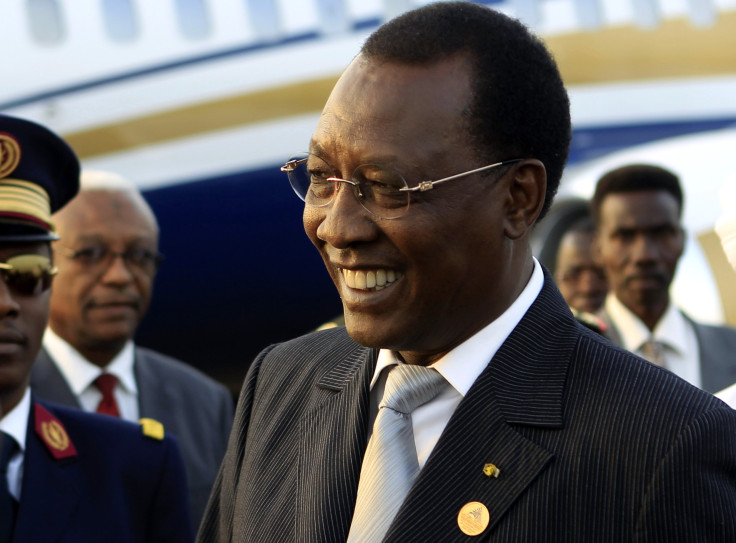For Chad And China, Oil Spill Challenges An Already Faltering Partnership

China's state-run oil company has run into some trouble in Chad. When government officials in the African country traveled to a southern oil field this week to monitor the activities of the China National Petroleum Corporation, they found massive -- and allegedly intentional -- oil spills killing trees and wildlife there. The operation has been suspended indefinitely on charges of environmental violations, and government officials sound livid.
Chadian Oil Minister Djerassem Le Bemadjiel said that the Chinese corporation had dug massive trenches and allowed oil to flow into them, and that CNPC then asked local workers to clean up the mess without giving them proper equipment. "We found flagrant violations of environmental standards by the company ... CNPC's behavior was unacceptable," said Bemadjiel, Reuters reports. "Not only do they not have facilities to clean spilled crude, there were also intentional spillages in order reduce costs."
The swift condemnation and suspension may help to keep CNPC's operations a bit more in line, but this incident is just another indication of the tense relationship between Chad and China. The two countries began to forge a unique bond seven years ago -- one that hinged on a simpler regulatory framework as compared to the West. But if this relationship is one that results in trenches full of wasted crude, Chad may decide to rethink its game plan.
West To East
Chad is a landlocked country straddling the Saharan divide between North and Central Africa; its environment is one of the most unforgiving, forcing a population of 12 million to deal with recurring droughts and constant food insecurity. After decades of instability and internal conflict, Chad's fighters are renowned for their skills at desert warfare -- the country's troops were a valuable addition to the counter-insurgency push in Mali this year.
National sovereignty takes high priority for the administration of this embattled state, which is headed by President Idriss Deby. He has spoken disparagingly of Western aid in the past, but that rhetoric hasn't put a damper on defense partnerships or trade with the United States. The two countries work together on counterterrorism training, and a whopping 82.5 percent of Chad's exports-- dominated by oil -- went to the U.S. last year, according to the CIA World Factbook. China placed a distant second with 6.7 percent of the country's 2012 exports.
Beijing's relationship with Chad mirrors its relationships with various other African countries -- China has an eye on natural resources, and its state-owned enterprises attract partners on the continent by offering deals that are often comparatively light on regulation. Beijing’s Ministry of Commerce reports that bilateral trade with Africa amounted to $198.5 billion last year, and could exceed $380 billion by 2015. But without the strict regulations favored by many Western organizations, incidents such as the crude spill are more likely to occur -- which is part of the reason why China's partnership with Chad has been plagued by difficulties over the past few years.
Picky Partners
In Chad, China has gained an odd reputation as a counterweight to the World Bank. Beijing resumed diplomatic ties with the country when N'djamena decided to drop its recognition of Taiwan in 2006. And just as Chad was warming to China, the World Bank was getting the cold shoulder. The lending institution had been helping to finance the construction of an oil pipeline stretching from southern Chad to a terminal on the Atlantic coastline of neighboring Cameroon. Also pitching in were Chevron (NYSE:CVX), Exxon Mobil (NYSE:XOM) and Malaysia's state-owned oil company Petronas.
The World Bank loan came with conditions, agreed upon in 2001. But by 2006, Deby was resisting stipulations that 80 percent of all royalties earned from the pipeline should be steered toward development, health care and education; he argued instead that defense spending was paramount, citing an insurgency backed by Sudan.
In 2007 -- by which point Chad was already producing about 170,000 barrels of crude oil per day -- China bought the rights to a huge oil exploration zone in the south. In 2008, a frustrated World Bank withdrew from the pipeline project after Chad repaid its loans. And in 2009, China began construction of Chad's first oil refinery just north of N'djamena; it became operational in 2011. The CNPC claims 60 percent ownership of the facility, while Chad's state-owned Société des Hydrocarbures du Tchad has 40 percent.
That agreement came with none of the development-geared stipulations that had bogged down the World Bank contract. The lending institution continues to work with Chad, but the focus is now on smaller-scale infrastructure and health care initiatives. The country remains one of the world's most underdeveloped, poverty stricken and corrupt states.
Beijing and N'djamena have kept up their partnership over the years, with China enjoying access to oil and Chad benefiting from a number of infrastructural projects, including roads, railroads and a hospital. But the relationship has grown rockier recently due to disagreements over oil pricing for Chadian markets, concerns about the safety of Chinese workers and diplomats in Chad, and broader disputes about China's footprint in the country, as evinced by the recent oil spill snafu. In addition, disputes have led to shutdowns at the N'djamena refinery at least twice since 2011.
These complications put Chad in a bit of a bind. It confronts the same question faced by a slew of resource-rich developing countries in Africa: in the hunt for economic partners, is it best to take the less intrusive deals favored by Chinese corporations, at risk of safety and transparency problems? Or do strictly regulated Western companies and institutions make for better partners, despite stipulations that challenge national sovereignty?
Chad has been grappling with this issue for years, and is sure to continue -- just as soon as that oil spill down south is all cleared up.
© Copyright IBTimes 2024. All rights reserved.











